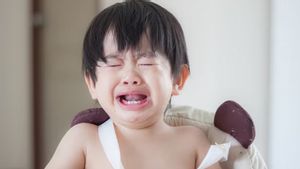
YOGYAKARTA Children express emotions honestly. This may make adults overwhelmed when they tantrum. When tantrums, small children feel destruction, one of which is excessive stimulation.
Sensory stimulation stimulates the body's response. If children accept it excessively, it will exceed their capacity so they feel too tired. Many factors play a role in excessive stimulation. Like a crowded afternoon in the park, summer, lack of sleep, or skipping breakfast. Stimulation of such stimulation may not be tolerated by a child. There may also be children who can accept the situation. That means, each child has different thresholds in accepting stimulation from the surrounding environment.
Excessive stimulation can occur when the level of sensory stimulation exceeds the current child's capacity. Each child has a limitation of their respective stimuli, and their ability to receive sensory stimulation can change regularly. This figure may be higher if the child has had enough rest and has just eaten a balanced meal or snack, while the figure may be lower if the child needs to take a nap or hasn't eaten for too long.
All types of sensory stimulation, whether visual, hearing, touch, or other types, have the potential to become an excessive burden for a child. Sometimes, this is a combination of the various types of information children receive.
Oversaturated stimulation can occur in regular situations at home, with a loud volume of TV and music, special cases like crowds of people at a party, and outdoor events, said pediatrician Pierrette Mimi Poinsett, MD. reported by Parents, Thursday, November 30.
For children with neurodivergens, for example, people with autism spectrum disorders (ASD), attention/hyperactivity campers (ADHD), or individuals with intellectual and developmental disabilities (GAKY) may have lower stimulation thresholds. For example, clothes labels, neon lights, electronic devices, or certain food textures are common sensory triggers in autistic individuals that can cause excessive stimulation. They may be more sensitive to sensory experiences compared to neurotypical individual experiences.
Signs of excessive stimulation vary according to age and temperament. Babies may respond to excessive stimuli by crying, moving their limbs, and/or turning away. For toddlers and preschoolers, they may show behavior similar to anger. They also get angry easily, look unwell, or express they are overwhelmed with words.
There are also children who have difficulty processing environmental stimulation by avoiding, escaping, or minimizing these stimuli. They may seem easily offended, restless, or not focused. You can also go back and forth, watch, or shake your feet.
Some of the behavior of children, maybe can increase more extremely. They can cry, scream, fall to the ground, even hurt themselves. This behavior occurs due to excessive stimulation, or called a crisis period. According to certified behavior analyst Kerri Milyko, Ph.D., BCBA-D., LBA (NV)., this reaction is like tantrums but not because of getting something' but an accidental response because the shoulders looking for sensory stimulation are too heavy to handle.
Once you realize that your child is experiencing excessive stimulation, the best thing you can do is remove these stimuli or keep children away from the environment. If you can't do it, try to reduce the level of stimulation as much as you can. For example by embracing tightly, covering your ears, and diming the lights.
Some young babies respond well when being carried or put in a baby's arms. Toddlers and preschoolers may be helped by doing calmer activities, such as reading books or singing familiar songs, "said Dr. Poinsett.
관련 항목:
Parents should not try to argue with children who are too stimulated or expect them to "handling it" themselves. They need your help. You can help your child organize yourself by giving him room to relax and calm down.
Milyko's message, be aware of what sensory experiences your child doesn't like. Try to minimize exposure to the experience if possible. If you feel your child is getting excessive stimulation, this may interfere with your daily life. Therefore, it's a good idea to ask for advice from a child health expert.
The English, Chinese, Japanese, Arabic, and French versions are automatically generated by the AI. So there may still be inaccuracies in translating, please always see Indonesian as our main language. (system supported by DigitalSiber.id)















